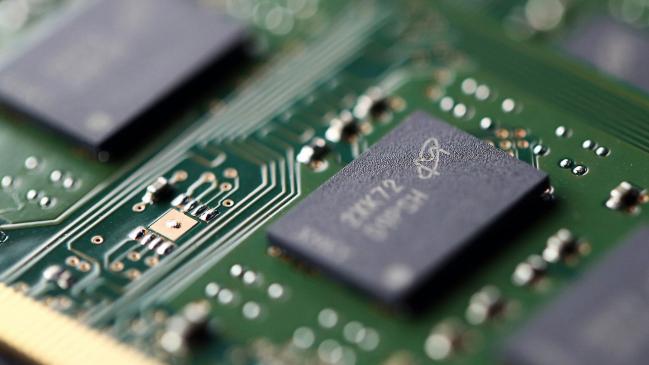(Bloomberg) -- A Taiwanese court ruled Friday that current and former engineers from United Microelectronics Corp. stole trade secrets from U.S. chipmaker Micron Technology Inc (NASDAQ:MU). and shared them with a government-backed mainland Chinese company, closing one chapter of a global dispute that’s stoked U.S.-Chinese tensions.
The district court of Taichung fined UMC NT$100 million ($3.4 million) after finding three engineers guilty of theft or assisting in the alleged theft. The trio was jailed for periods ranging from 4.5 to 6.5 years and fined between NT$4 million and NT$6 million.
The case is part of a years-long dispute spanning two continents that’s deepened divisions between Beijing and Washington. Intellectual property theft is among the Trump administration’s chief complaints as it wages a campaign to contain China that’s rattled global markets. China, which is trying to become a major player in semiconductors, has repeatedly denied that its companies poach trade secrets.
UMC said it will appeal the ruling, saying it has mechanisms to protect its customers’ intellectual property rights and it did not violate trade secrets laws. “In its appeal against the ruling and the excessively disproportionate penalty, UMC will cite many irregularities in both the investigation and the case itself,” the Taiwanese company said in a statement.
Micron welcomed the verdict in a statement and said justice had been served. “The misappropriation of trade secrets and their transfer outside of Taiwan is detrimental to the country’s entire semiconductor industry and threatens future competitiveness. This judgment further reinforces the importance of intellectual property protection in Taiwan, demonstrating that criminal misappropriation will be appropriately addressed,” the company said.
Micron first sued UMC and its Chinese partner -- Fujian Jinhua Integrated Circuit Co., which is said to have benefited -- in 2017 in the U.S. for stealing trade secrets, setting off the dispute between the top U.S. memory chipmaker and one of Asia’s largest manufacturers of made-to-order semiconductors. In January of the following year, UMC counter-sued in mainland China and that July, a Chinese court banned sales of some Micron chip sales in the country. In November 2018, UMC and Jinhua, along with the three individuals, were indicted in California, charged with conspiring to steal trade secrets from Micron.
Friday’s decision coincides with growing scrutiny of the role that Taiwanese companies play as global leaders in chipmaking and electronics assembly. In May, the U.S. slapped a ban on the sale without approval of silicon made with American gear to Huawei Technologies Co., a move regarded as an attempt to prevent industry giant Taiwan Semiconductor Manufacturing Co. from supplying its top Chinese customer.
“The U.S. is intensifying its scrutiny of Chinese investors and companies and it will not allow Taiwan to become a loophole,” said Carol Lin, a law professor at National Chiao Tung University, speaking before the verdict was announced. She said that Taiwan’s legal process for IP theft cases is long and there is no knowing when this UMC case will be finalized. “This actually may undermine foreign companies’ confidence in Taiwan,” said Lin.
Taichung prosecutors had indicted UMC employees J.T. Ho and Kenny Wang in 2017 on charges of breaching Micron’s trade secrets. Both are former employees of the U.S. chipmaker. Ho and Wang replicated Micron’s DRAM data onto their own devices and used the material for their work at UMC including a partnership project with China’s Fujian Jinhua, prosecutors said in an indictment document reviewed by Bloomberg News.
Wang is no longer with UMC, according to a company spokesman. A third UMC staffer, Rong Leh-tian, instructed Wang to incorporate Micron’s design information into UMC’s own, according to the indictment. The intent of that was to shorten chip development times the court said in Friday’s statement.
In reaching its verdict, the court cited evidence including how Ho was on both UMC’s and Jinhua’s payroll at the same time and it was clear the allegedly stolen technology was intended for use in China.
“J.T. Ho earned two salaries respectively from UMC and Jinhua, so it is very clear he intended to use [Micron data] on mainland China,” the court said in a statement. “Kenny Wang and Rong Leh-Tian both leaked Micron’s trade secrets to UMC for the use of UMC’s relevant business units ... and the final research was to be transferred to Jinhua for mass production, so they had the intention to use [Micron’s data] in mainland China.”
Rong, a senior manager, instructed the other two defendants to wipe any Micron data on their computers before Taiwanese prosecutors raided their workstations, but investigators found a large volume of material from the U.S. company on the devices regardless, according to the court.
The court said Ho had received some NT$5 million from both UMC and Jinhua, while Wang got NT$1.5 million and Rong NT$1.6 million from UMC.
“The defendants’ conduct have led to Micron’s loss of advantage and competitiveness in the market of products connected to the leaked trade secrets and undermined Micron’s interests. This damage is difficult to remedy due to the leak,” the court said in a statement.
(Updates with response from Micron in fifth paragraph)
©2020 Bloomberg L.P.
